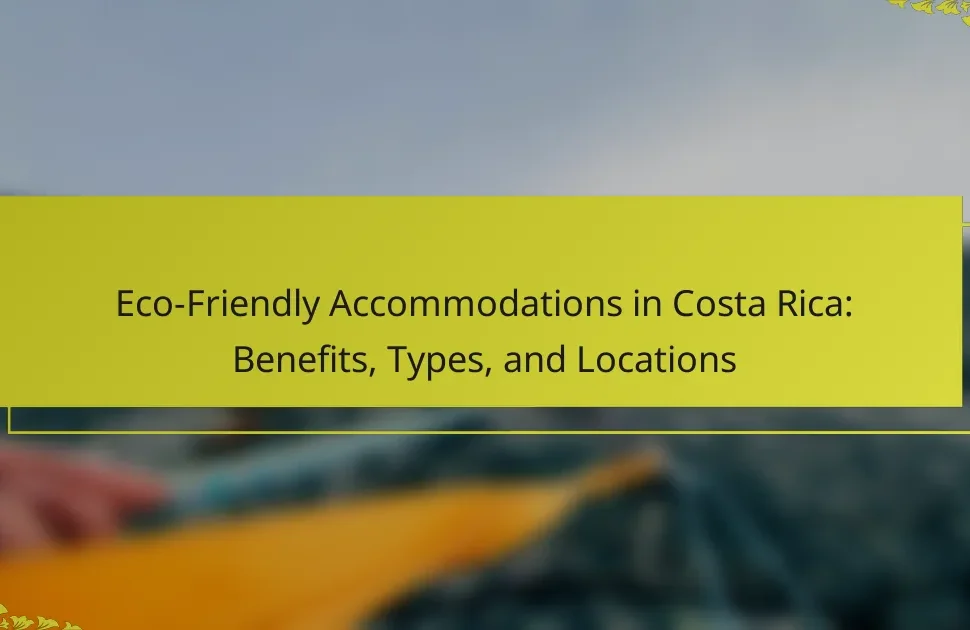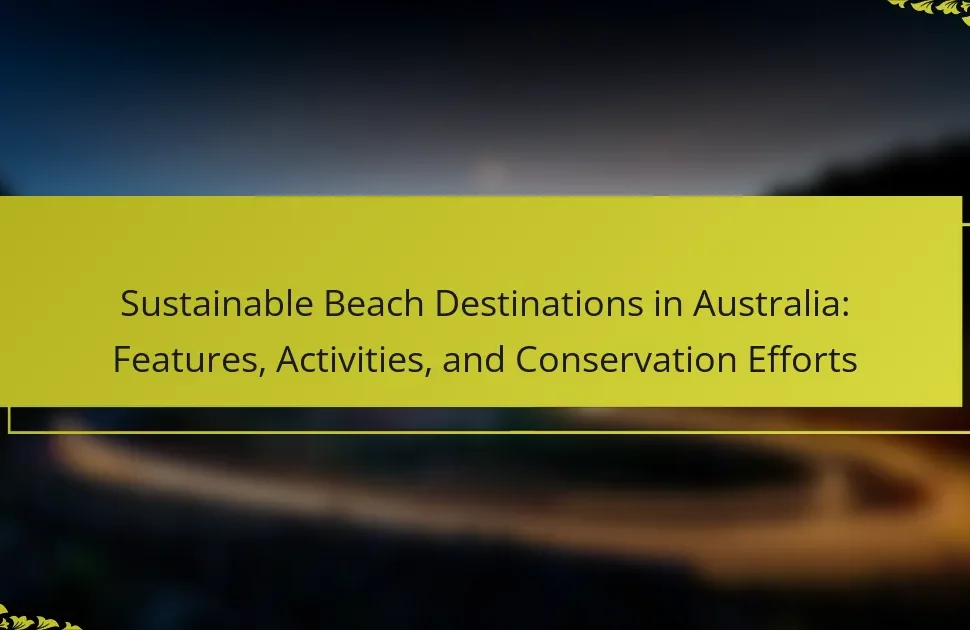Solar-powered resorts in Thailand provide eco-friendly energy solutions and sustainable architecture, appealing to environmentally conscious travelers. These resorts offer benefits like cost savings, reduced carbon footprints, and immersive nature experiences. Guests can enjoy unique amenities such as solar-heated pools and organic dining, while also participating in educational programs on sustainability. Notable examples include The Sarojin, Eco Resort Chiang Mai, and The Sanctuary Thailand, each emphasizing a commitment to both luxury and environmental responsibility.
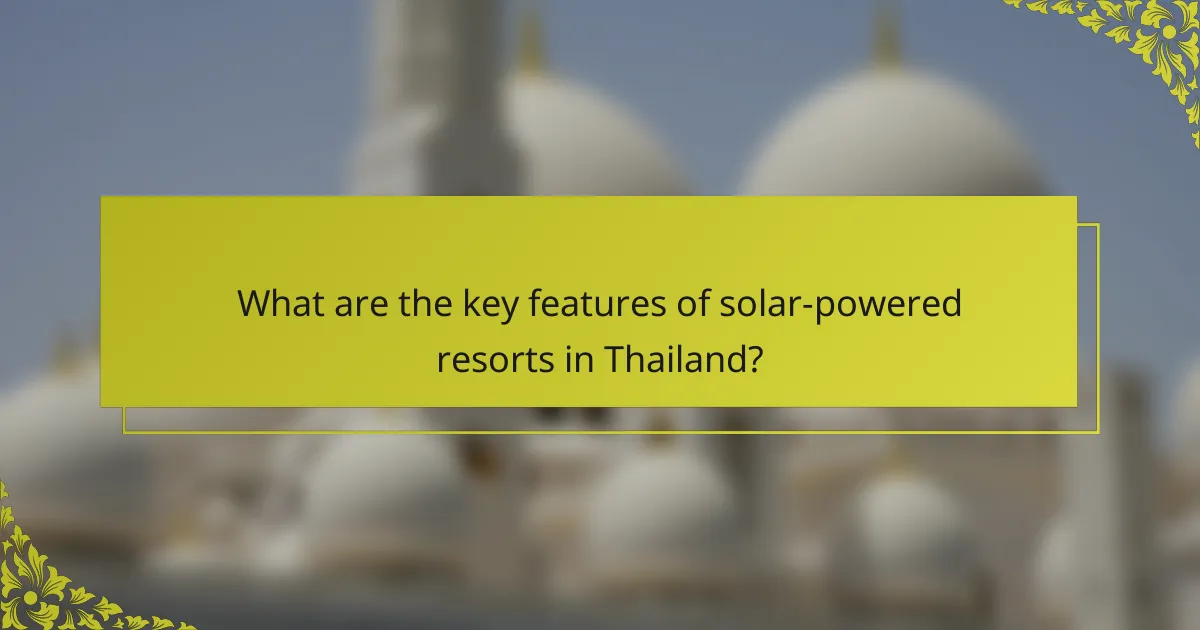
What are the key features of solar-powered resorts in Thailand?
Solar-powered resorts in Thailand feature eco-friendly energy solutions, sustainable architecture, and self-sufficiency. These resorts often include solar panels, energy-efficient appliances, and water conservation systems. Guests enjoy reduced carbon footprints and immersive nature experiences. Additionally, many resorts provide educational programs on sustainability practices, enhancing the overall eco-tourism experience.
How do solar energy systems operate within these resorts?
Solar energy systems in Thai resorts operate by converting sunlight into electricity, providing sustainable energy for various resort functions. These systems typically include solar panels, inverters, and battery storage. Solar panels capture sunlight and convert it into direct current (DC) electricity. Inverters then convert DC electricity into alternating current (AC) for use in the resort’s electrical systems. Battery storage allows resorts to store excess energy for use during cloudy days or nighttime. This integration reduces reliance on fossil fuels, lowers energy costs, and enhances the resort’s eco-friendly appeal.
Which amenities are commonly powered by solar energy?
Common amenities powered by solar energy in resorts include lighting, heating systems, swimming pools, and water heaters. These features enhance sustainability while reducing energy costs. Solar-powered resorts in Thailand often utilize solar panels to provide electricity for air conditioning and recreational facilities, promoting eco-friendly tourism.
What sustainable practices complement solar energy usage?
Sustainable practices that complement solar energy usage in Thai resorts include water conservation, waste management, and local sourcing. These practices enhance the environmental benefits of solar power by reducing resource consumption and promoting sustainability. For example, rainwater harvesting systems can minimize water use, while composting organic waste supports a circular economy. Additionally, utilizing locally sourced materials reduces carbon footprints and supports local economies.
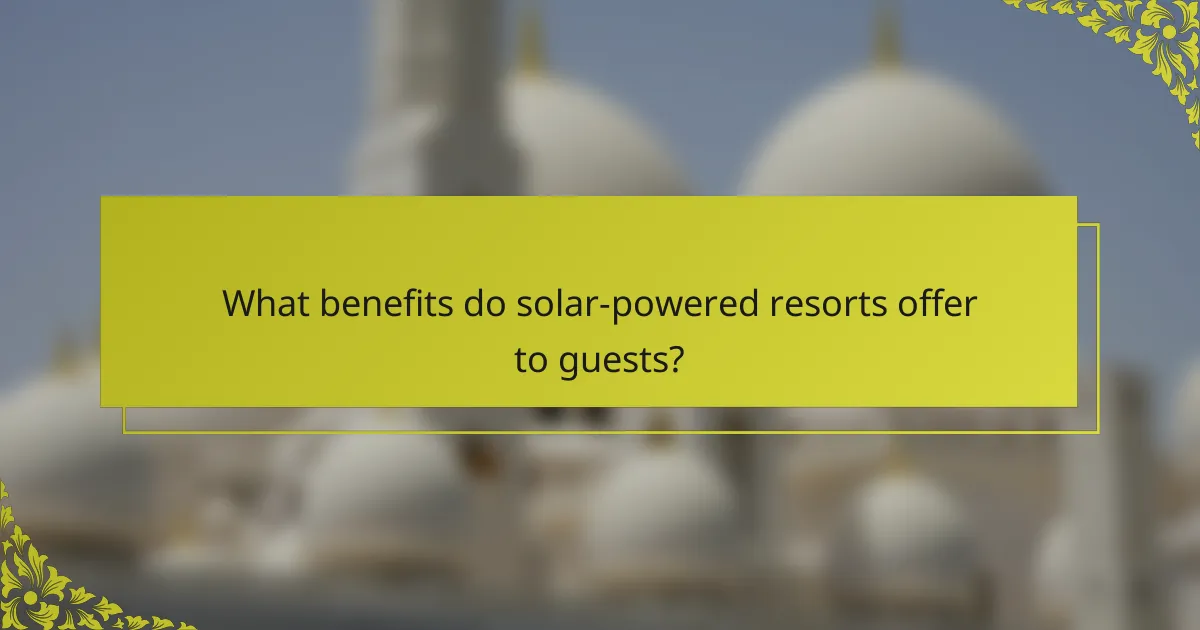
What benefits do solar-powered resorts offer to guests?
Solar-powered resorts in Thailand offer guests numerous benefits, including eco-friendliness, cost savings, and enhanced comfort. These resorts reduce carbon footprints by utilizing renewable energy sources. Guests enjoy lower utility costs, which can lead to more affordable stays. Additionally, solar energy systems often provide reliable power, ensuring uninterrupted services. The unique aspect of these resorts is their commitment to sustainability, appealing to environmentally conscious travelers.
How do they contribute to environmental sustainability?
Solar-powered resorts in Thailand significantly contribute to environmental sustainability by reducing carbon emissions and conserving energy. These resorts utilize renewable energy sources, which diminishes reliance on fossil fuels. As a result, they lower their overall environmental footprint while promoting eco-friendly tourism. Many solar-powered resorts also implement water conservation practices and waste management systems, further enhancing their sustainability efforts. This commitment to the environment attracts eco-conscious travelers, fostering a sustainable tourism model that benefits local communities and ecosystems.
What cost savings can guests expect from staying at these resorts?
Guests at solar-powered resorts in Thailand can expect significant cost savings through reduced energy bills and eco-friendly practices. These resorts often utilize renewable energy sources, leading to lower operational costs. As a result, many pass these savings onto guests, providing affordable accommodation options. Additionally, some resorts offer complimentary amenities, such as free electric vehicle charging and discounts for longer stays, further enhancing overall savings.
Why do guests prefer eco-friendly accommodations?
Guests prefer eco-friendly accommodations because they prioritize sustainability and environmental responsibility. Solar-powered resorts in Thailand exemplify this trend, offering features like renewable energy usage and lower carbon footprints. These resorts provide benefits such as reduced energy costs and enhanced guest experiences through nature immersion. Reviews often highlight the unique atmosphere and commitment to conservation that these resorts maintain, appealing to eco-conscious travelers.
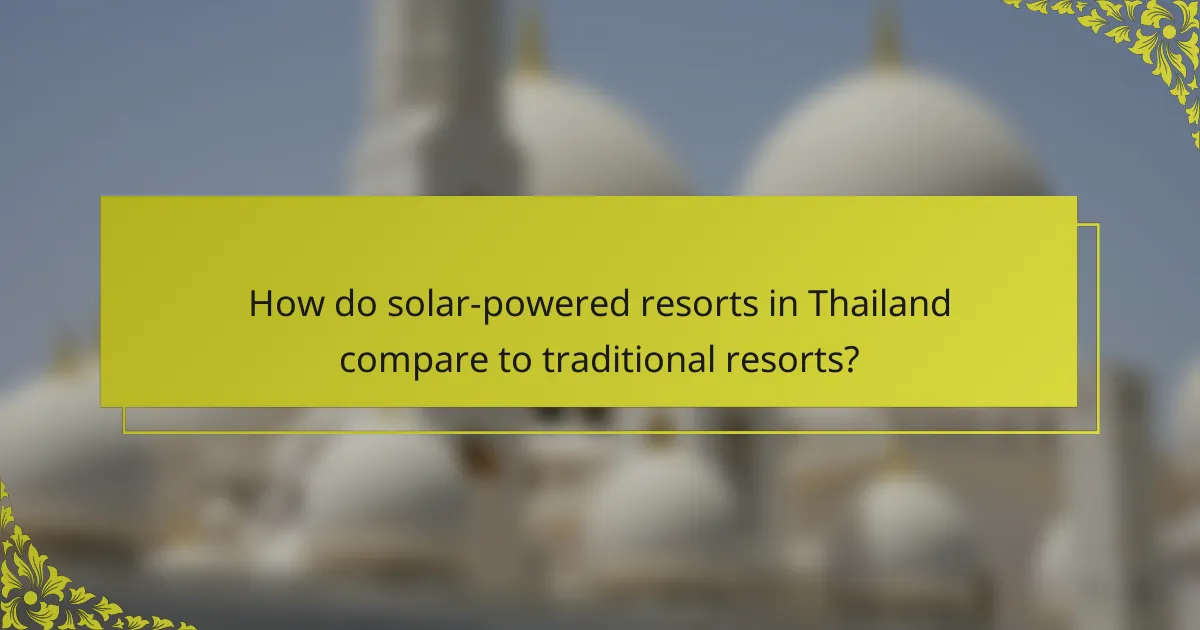
How do solar-powered resorts in Thailand compare to traditional resorts?
Solar-powered resorts in Thailand offer sustainable advantages over traditional resorts, primarily in energy efficiency and environmental impact. These resorts utilize renewable energy sources, reducing reliance on fossil fuels. They often feature innovative designs that enhance guest experiences while minimizing carbon footprints.
In contrast, traditional resorts typically depend on conventional energy sources, resulting in higher operational costs and environmental consequences. Solar-powered resorts may provide lower energy bills, appealing to eco-conscious travelers. Additionally, they often integrate local materials and practices, enriching cultural experiences.
Overall, solar-powered resorts present a compelling alternative, balancing luxury with sustainability. This unique attribute enhances their appeal in a growing market focused on eco-friendly tourism.
What are the differences in energy consumption patterns?
Solar-powered resorts in Thailand exhibit distinct energy consumption patterns compared to traditional resorts. These resorts utilize renewable energy sources, significantly reducing reliance on fossil fuels. Solar panels generate electricity, which powers amenities and services, leading to lower operational costs. Additionally, energy consumption peaks during daylight hours, aligning with solar energy production. This results in efficient energy use and sustainability. In contrast, conventional resorts often experience higher energy costs due to reliance on non-renewable energy sources. Overall, solar-powered resorts promote eco-friendly practices while optimizing energy efficiency.
Which types of guests are attracted to solar-powered resorts?
Eco-conscious travelers, luxury seekers, and wellness enthusiasts are primarily attracted to solar-powered resorts. These guests value sustainability, innovative experiences, and natural settings. Eco-conscious travelers appreciate the environmental benefits, while luxury seekers enjoy unique, upscale amenities. Wellness enthusiasts are drawn to holistic offerings and serene atmospheres.
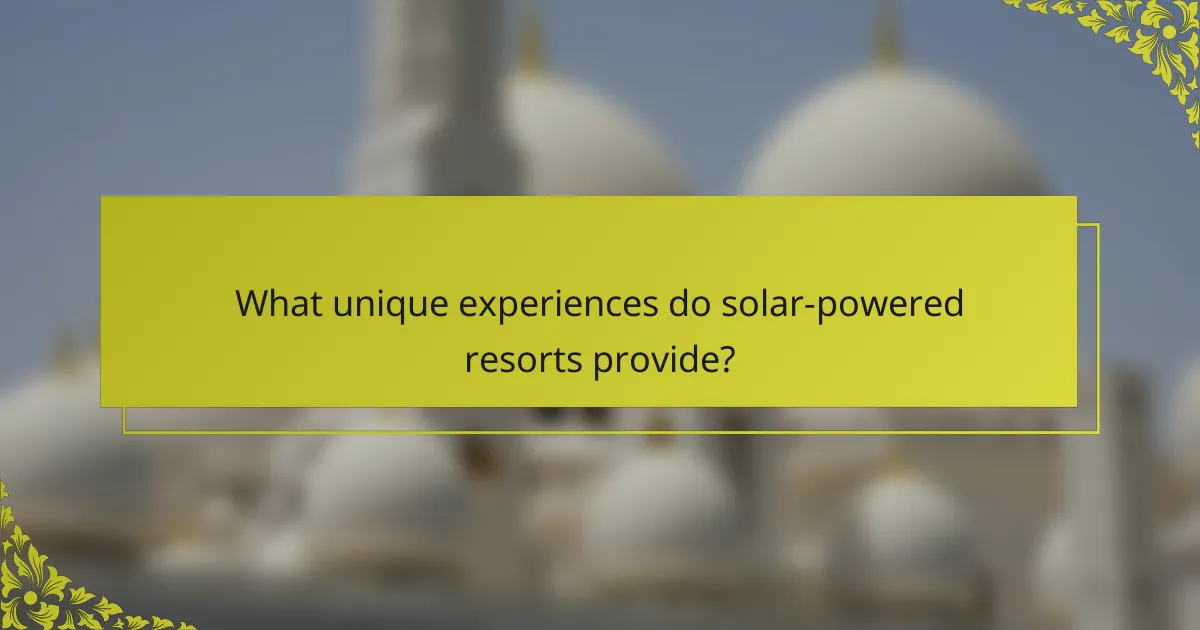
What unique experiences do solar-powered resorts provide?
Solar-powered resorts in Thailand offer unique experiences through sustainable practices, eco-friendly amenities, and immersive nature activities. Guests enjoy solar-heated pools, organic farm-to-table dining, and energy-efficient accommodations. These resorts often provide opportunities for eco-tours, wildlife observation, and cultural experiences, enhancing the connection to the environment. Additionally, many resorts emphasize wellness with yoga sessions and spa treatments powered by renewable energy.
How do local cultures influence the design of these resorts?
Local cultures significantly shape the design of solar-powered resorts in Thailand by integrating traditional aesthetics and sustainable practices. These resorts often reflect local architectural styles, using materials sourced from the surrounding environment. For example, many incorporate bamboo and local wood, which reduces carbon footprint. Additionally, cultural values emphasize harmony with nature, influencing resort layouts that blend seamlessly into the landscape. Local culinary traditions also play a role, with resorts offering authentic Thai cuisine prepared with organic ingredients. This cultural infusion enhances guest experiences while promoting sustainability and community engagement.
What exclusive activities are available at solar-powered resorts?
Solar-powered resorts in Thailand offer exclusive activities such as eco-friendly tours, organic cooking classes, and wellness retreats. Guests can participate in solar energy workshops and nature conservation programs. Unique experiences include stargazing sessions powered by solar lighting and guided hikes through pristine landscapes. These activities promote sustainability while enhancing guest engagement with the environment.
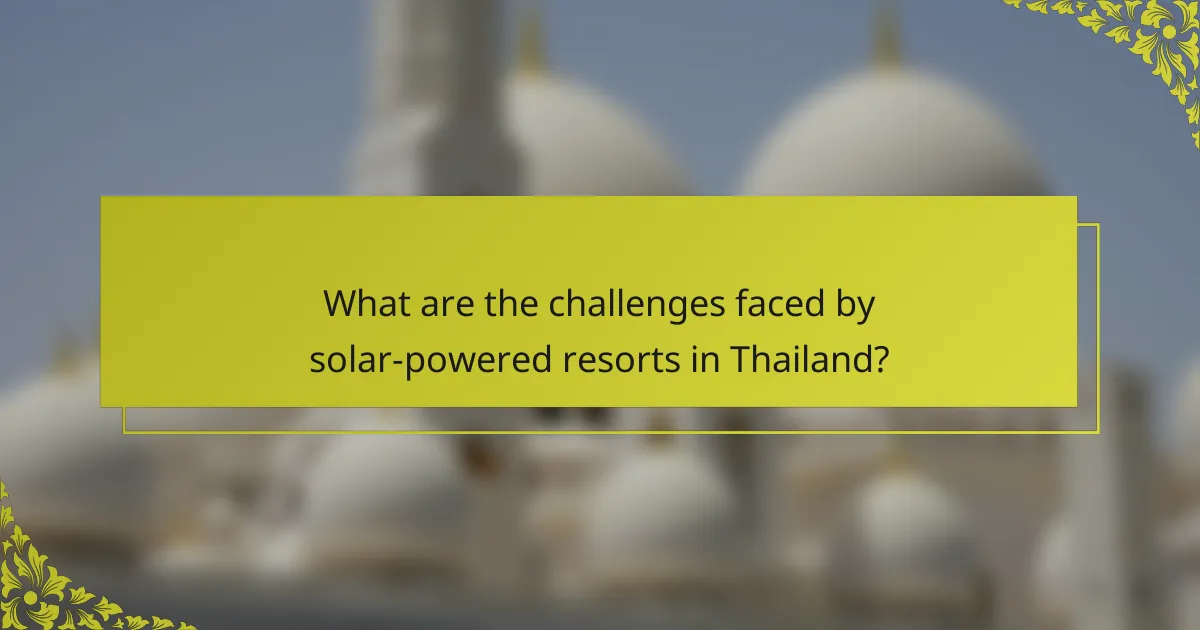
What are the challenges faced by solar-powered resorts in Thailand?
Solar-powered resorts in Thailand face several challenges. High initial investment costs for solar technology can deter operators. Additionally, inconsistent sunlight due to seasonal variations affects energy generation. Maintenance of solar panels in humid conditions poses logistical issues. Limited access to skilled technicians for repairs further complicates operations. Lastly, regulatory hurdles can impede the integration of solar energy solutions.
How do seasonal weather patterns affect energy generation?
Seasonal weather patterns significantly influence energy generation at solar-powered resorts in Thailand. The effectiveness of solar panels varies with changes in sunlight exposure and temperature.
During the dry season, resorts benefit from increased sunlight, optimizing energy production. Conversely, the rainy season can lead to reduced efficiency due to cloud cover and precipitation.
Temperature also plays a role; solar panels operate more efficiently in cooler conditions. Thus, understanding these seasonal variations helps resorts manage energy resources effectively, ensuring sustainability and cost savings.
What regulatory hurdles do these resorts encounter?
Solar-powered resorts in Thailand face several regulatory hurdles. These include obtaining permits for renewable energy installations, compliance with local environmental laws, and navigating zoning regulations. Additionally, there may be challenges related to grid connection and energy storage requirements. These factors can delay project timelines and increase costs.

What are some notable solar-powered resorts in Thailand?
Some notable solar-powered resorts in Thailand include The Sarojin, Eco Resort Chiang Mai, and The Sanctuary Thailand. These resorts feature sustainable energy solutions, eco-friendly designs, and unique experiences for guests.
The Sarojin, located in Khao Lak, uses solar energy to power its facilities. It offers luxurious accommodations and direct access to beautiful beaches. Eco Resort Chiang Mai focuses on sustainability with solar panels and organic farming practices. The Sanctuary Thailand, situated on Koh Phangan, provides a holistic experience, emphasizing wellness and nature.
These resorts not only reduce their carbon footprint but also enhance guest experiences through their commitment to sustainability.
Which resorts have received exceptional reviews from guests?
Several solar-powered resorts in Thailand have received exceptional reviews from guests. Notable mentions include the Eco Resort in Koh Samui, praised for its sustainable practices and stunning ocean views, and the Green Village in Chiang Mai, recognized for its eco-friendly amenities and tranquil environment. The Bamboo Resort in Phuket stands out for its unique architecture and commitment to renewable energy. Guests consistently highlight the exceptional service and immersive nature experiences at these resorts.
What makes each highlighted resort unique in its offerings?
Each highlighted solar-powered resort in Thailand offers unique features that enhance sustainability and guest experience. The resorts utilize renewable energy, providing eco-friendly accommodations while reducing carbon footprints.
1. Resort A focuses on luxury amenities powered entirely by solar energy, offering a unique blend of comfort and sustainability.
2. Resort B emphasizes wellness, incorporating solar power into spa treatments and healthy dining options, creating a holistic experience.
3. Resort C showcases innovative architecture designed to maximize solar energy efficiency, offering guests a unique aesthetic appeal.
4. Resort D prioritizes community involvement, using solar energy to support local initiatives, providing a distinctive cultural experience for visitors.
5. Resort E features educational programs on renewable energy, allowing guests to engage with sustainability practices, making it a unique learning destination.
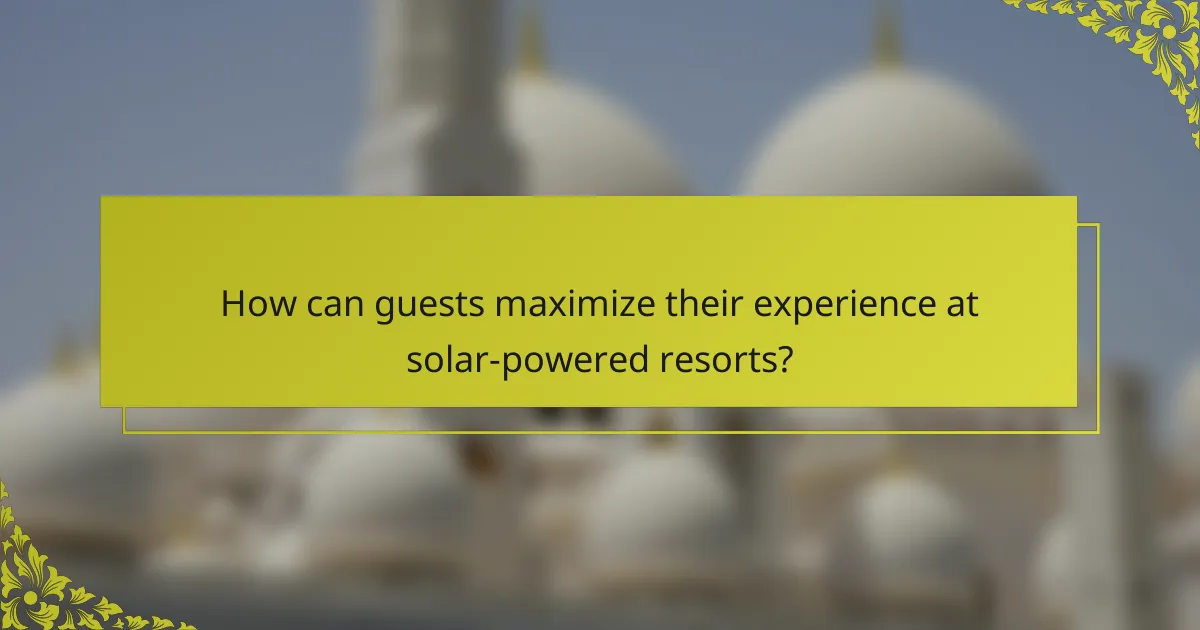
How can guests maximize their experience at solar-powered resorts?
Guests can maximize their experience at solar-powered resorts by engaging with sustainable practices and local culture. Prioritize activities that promote environmental awareness, such as guided eco-tours or workshops on renewable energy.
Enjoy farm-to-table dining options that highlight local ingredients, enhancing both taste and sustainability. Participate in community events to connect with locals and learn about their traditions.
Utilize resort amenities that support eco-friendly practices, like solar-heated pools or electric vehicle rentals. Lastly, take advantage of wellness programs that incorporate natural surroundings, such as yoga classes in serene outdoor settings.
What tips should guests consider for a sustainable stay?
Guests should prioritize eco-friendly practices for a sustainable stay at solar-powered resorts in Thailand. Consider these tips:
1. Choose resorts that utilize solar energy for their operations.
2. Limit water usage by taking shorter showers and reusing towels.
3. Support local businesses by dining at nearby restaurants and purchasing local goods.
4. Participate in on-site sustainability programs, such as beach clean-ups or tree planting.
5. Use public transportation or bicycles to explore the area, reducing carbon footprint.
6. Respect wildlife and natural habitats by observing from a distance and avoiding littering.
What common mistakes should guests avoid when booking?
Guests should avoid common mistakes like overlooking solar energy benefits, not checking reviews, and ignoring location specifics. These errors can lead to dissatisfaction during their stay at solar-powered resorts in Thailand.
1. Failing to research the resort’s solar features, which can enhance sustainability and comfort.
2. Ignoring guest reviews that highlight unique attributes like eco-friendly practices and amenities.
3. Not verifying the resort’s location, affecting access to attractions and natural beauty.
4. Overlooking cancellation policies that can impact travel plans.
5. Assuming all solar-powered resorts offer the same services and experiences.

